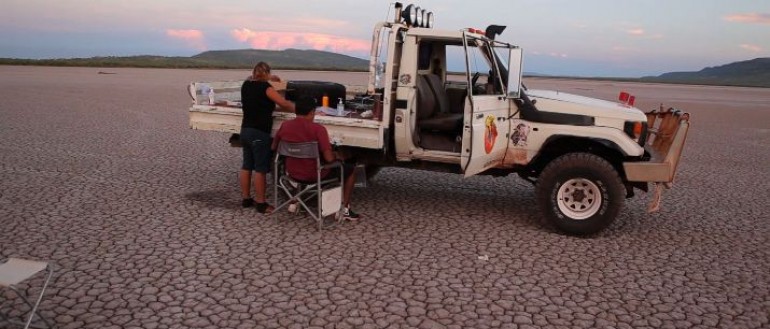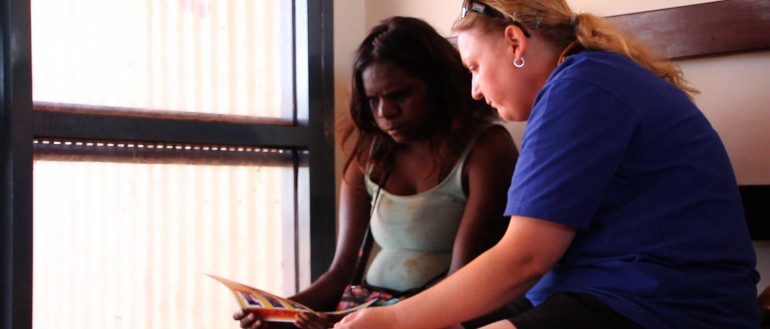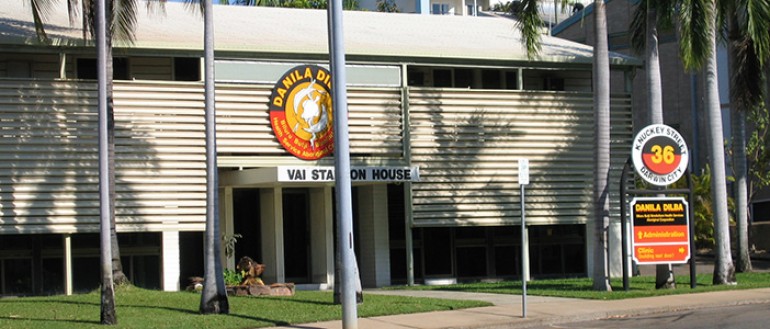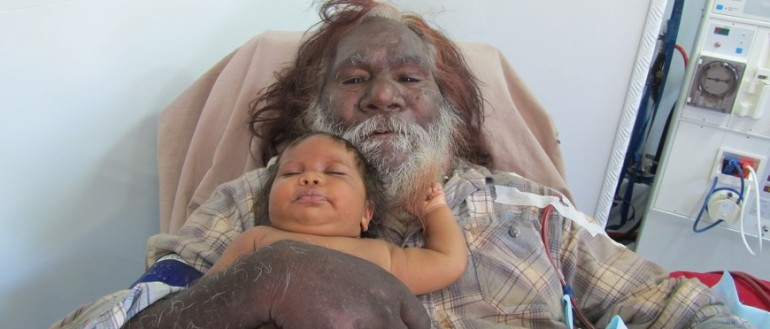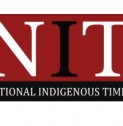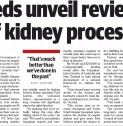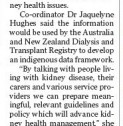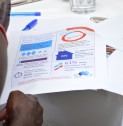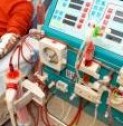Chronic kidney disease (CKD) affects many Australians, however Aboriginal and Torres Strait Islander people living in remote areas suffer the heaviest burden of all Australians. Aboriginal and Torres Strait Islander people tend to be affected at a younger age, are more likely to present late for dialysis, are less likely to receive a transplant and, in comparison to non-Indigenous people, will die younger.
People with CKD suffer poor health outcomes and reduced quality of life but for people living in remote communities, where there are limited dialysis services, the impact on families and communities is devastating.
From past research we know that kidney disease is strongly linked to other chronic diseases such as diabetes and heart disease. To tackle and lessen the burden of chronic kidney disease in Aboriginal and Torres Strait Islander people we need to understand the factors that predict progression, including the acceptability of different models of care.
Our research focus:
- To discover the best ways to diagnose, treat and prevent chronic disease such as diabetes, heart and kidney disease.
- To identify ways to improve systems and processes to support patients with kidney disease across the care continuum.
- To translate research findings into policy and practice.
Our research impact:
- In 2016 our research identified the most efficient, cost-effective and acceptable aspects of CKD management programs for Aboriginal and Torres Strait Islander people.
- Our findings demonstrated that opportunities existed to design systems to support primary health services with timely, targeted and evidence-based specialist care in the identification and management of people with kidney disease.
- In partnership with the government and non-government health services we have designed and built an integrated clinical decision support tool for early CKD identification and management, to consolidate patient records from multiple source systems and close the information gap between service providers.
- Our research has highlighted the need to include the patient perspective in health care design and delivery. We have worked closely with patient groups, consumers and Aboriginal and Torres Strait Islander co-researchers in a variety of ways to develop sustainable mechanisms for the inclusion of the patient voice in service delivery. From facilitating the development of patient-led cultural awareness programs, to advocating for greater Indigenous knowledge of, and authority over, their data, to understanding ‘what makes a good life and a good life on dialysis’ for Indigenous people.
- With our partners across government and non-government sectors we are working together to determine the most cost-effective dialysis models of care. This work will synthesise the data and information from multiple sources and will include perspectives of efficiency, effectiveness and acceptability – the number, money and people stories.
Collaborators
- Ampilatwatja Health Care Aboriginal Corporation
- AMSANT
- ANZDATA
- Central Australian Aboriginal Congress
- Central Australian Renal Voice
- Department of Corporate and Digital Development
- Fiona Stanley Hospital
- Katherine West Health Board
- Kidney Health Australia
- Laynhapuy Homelands Aboriginal Corporation Health
- Mala’la Health Service Aboriginal Corporation
- Melbourne Health
- Miwatj Health Aboriginal Corporation
- National Health and Medical Research Council
- Northern Territory Primary Health Network
- NT Department of Health
- NT Department of Housing
- Purple House
- Renal Advocacy Advisory Committee
- Royal Adelaide Hospital
- Transplant Society of Australia and New Zealand
- Western Health
- Wurli Wurlijang Health Service
- University of Tasmania
Key staff:
- Associate Professor Gillian Gorham
- Associate Professor Asanga Abeyaratne
- Associate Professor Oyelola Adegboye
- Dr Sophie Pascoe
- Ben Creswick
- Henry Craigie
- Poonam Purohit
- Victoria Thanasos
- Cheryl Ross
- Natalie Merida
- Stephanie Long
- Lani Hewitt
- Archana Shapkota
- Yomei Jones
- Daniel Winder
- Rose Mulkula
- Cynthia Tetteh
- James Harley
- Trudi Sieland
Honorary Researchers
PhD Researchers
- Dr Winnie Chen
- Dr Sajith Nayer
- Dr Edith Waugh
- Vongayi Majoni
Current projects:
- Territory Kidney Care: A care clinical decision support system to facilitate integrated care for people with chronic kidney disease in the Northern Territory
- RART (Rapid Applied Research Translation)
- Territory Integrated Care: Primary health data Linkage Using Software (TIC PLUS)
- The CKD Consortium: Evaluation of chronic kidney disease identification and management in primary care in three jurisdictions across Australia
- Evaluation of impact of Territory Kidney Care (TKC) systems on chronic kidney disease (CKD) identification and management in Northern Territory (NT)
- My Health Record upload from Territory Kidney Care
- INFERR Study: Intravenous Iron Polymaltose For Indigenous Patients with High Ferritin Levels on Haemodialysis; A Prospective, Open-Label, Blinded Endpoint, Randomised Controlled Trial
- Return to Country: A national platform study to return Indigenous renal patients home
- Dialysis Models of Care: A partnership project to examine the costs and outcomes of different dialysis models and proximity to home
- 'Making Sense and Informing Action': Renal Research Knowledge Translation and Exchange with Aboriginal People, Policy Makers and Service Providers
- PK Study: Comparison of immunosuppressant drug pharmacokinetics in Aboriginal and non-Aboriginal Australian kidney transplant recipients
- North to South: The care and outcomes of people with end-stage kidney diseases in South Australia and the Northern Territory, 2001-2018
- Medication monitoring in NT Indigenous kidney transplant recipients
- Chronic kidney disease, diabetes mellitus and water quality in remote NT communities
- eGFR study: accurate assessment of renal function and progression of chronic kidney disease in Indigenous Australians
Recently completed projects:
- Acute Kidney Injury Retrospective Study
- Catching Some Air-Asserting Indigenous Information Rights in Renal Disease
- Central Australian Renal Study Technical Report Update
- Closing the loop on life-threatening melioidosis infections: observational research informing clinical practice change and policy for adults with severe kidney disease
- Developing a patient-led component of cultural awareness training for renal services in Alice Springs.
- Distance and the impact on electrolyte results in the NT
- Evaluation of CKD management in select NT Aboriginal community controlled health organisations
- Evaluation of Renal Case Management Program
- Evaluation of Top End Health Services Renal Outreach Program
- Final evaluation of Top End Outreach Ophthalmology Resource Project
- Forensic approach for reservoir identification for serious S. aureus infections in Top End dialysis clients (STARRS)
- Fred Hollows Foundation Remote Service Delivery Evaluation
- Improving Indigenous Kidney Transplant Outcomes
- Indigenous Patient Voices
- Socioeconomic outcomes and ESKD
- Systematic review of chronic kidney disease programs
- Urine ACR ratio and the impact of contaminants
- Ritte, R., Lawton, P., Hughes, J., Barzi, F., Brown, A., Mills, P., Hoy, W., O'Dea, K., Cass, A., & Maple-Brown, L. (2020). Chronic Kidney Disease and Socio-economic Status: a cross sectional study. Ethnicity and Health, 25(1): 93-109.
- Hughes, J., Majoni, S., Barzi, F., Harris, T., Signal, S., Lowah, G., Kapojos, J., Abeyaratne, A., Sundaram, M., Goldrick, P., Jones, S., McFarlane, R., Campbell, L., Stephens, D. & Cass, A. (2019). Incident haemodialysis and outcomes in the Top End of Australia. Australian Health Review, -. doi: 10.1071/AH18230.
- Gorham, G., Howard, K., Zhao, Y., Ahmed, A.M.S., Lawton, P.D., Sajiv, C., Majoni, S.W., Wood, P., Conlon, T., Signal, S., Robinson, S.L., Brown, S. & Cass, A. (2019). Cost of dialysis therapies in rural and remote Australia - a micro-costing analysis. BMC Nephrol, 20(231), 3-11. doi: 10.1186/s12882-019-1421-z
- Gorham, G., Majoni, S.W., Lawton, P., Brown, S., Dube, B., Conlon, T., Cherian, S., Wood, P., Signal, S. & Cass, A. (2018). Interesting times - evolution of dialysis in Australia's Northern Territory (1980-2014). Renal Society of Australasia Journal,14(3),108-16.
- Li, L., Guthridge, S., Li, S., Zhao, Y., Lawton, P., & Cass, A. (2018). Estimating the total prevalence and incidence of end-stage kidney disease among Aboriginal and non-Aboriginal populations in the Northern Territory of Australia, using multiple data sources. BMC Nephrology, 19:15. doi: 10.1186/s12882-017-0791-3.
- Hughes, J., Dembski, L., Kerrigan, V., Majoni, S., Lawton, P., & Cass, A. (2018). Indigenous Patient Voices: Gathering Perspectives Finding Solutions for chronic and end stage kidney disease, 2017 Symposium Report. Darwin Northern Territory. Nephrology, 23(S1): 5-13.
- Gorham, G., Howard, K., Togni, S., Lawton, P., Hughes, J., Majoni, S.W., Brown, S. Barnes, S. & Cass, A. (2017). Economic and quality of care evaluation of dialysis service models in remote Australia: protocol for a mixed methods study. BMC Health Serv Res, 17, 320. doi: 10.1186/s12913-017-2273-5.
- Devitt, J., Anderson, K., Cunningham, J., Preece, C., Snelling, P. & Cass, A. (2017). Difficult conversations: Australian Indigenous patients' views on kidney transplantation. BMC Nephrol, 18(1), 310. doi: 10.1186/s12882-017-0726-z.
- Maple-Brown, L.J., Hughes, J.T., Ritte, R., Barzi, F., Hoy, W.E., Lawton, P.D., Jones, G.R.D., Death, E., Simmonds, A., Sinha, A.K., Cherian, S., Thomas, M.A.B., McDermott, R., Brown, A.D.H., O'Dea, K., Jerums, G., Cass, A & MacIsaac, R.J.. (2016). Progression of kidney disease in Indigenous Australians: The eGFR follow-up study. Clinical Journal of American Society of Nephrology, 11(6), 993-1004. doi: 10.2215/CJN.09770915.
- Hughes, J.T., Maple-Brown, L.J., Thomas, M., Lawton, P.D., Sinha, A. Cass, A., Barzi, F., Jones, G.R.D., Jerums, G., MacIsaac, R.J., O'Dea, K. & Hoy, W.E. (2016). Cross-sectional associations of albuminuria among Aboriginal and Torres Strait Islander adults: the eGFR Study. Nephrology, 23, 37-45. doi: 10.1111/nep.12956.
Click here to view more kidney publications in PubMed.
- Stay strong on country - a message about coronavirus from Barunga, NT
- Stay strong on country - a message about coronavirus from Darwin, NT (English)
- Stay strong on country - a message about coronavirus from Tiwi, NT (Tiwi)
- Stay strong on country - a message about coronavirus for Yolŋu
- Stay strong on country - a message about coronavirus from Lajamanu, NT (in Warlpiri)
- History and database of cultural awareness programs in the Northern Territory
- The transplant story: a personal story
- The transplant story: a personal story promo
- Kidney stories
-

ABC | Concerns about drinking water quality in 'almost all' remote NT communities. What can be done about it?
Laramba resident Stanley Fletcher is worried that long-term exposure to the community's drinking water is making people sick.
-
Territory Q | NT Digital Excellence Awards
Community Benefit Award in partnership with DXC Technology - Menzies Territory Kidney Care
-

ABC News | No solution before NT election for Indigenous dialysis patients desperate to get home
Researcher Gillian Gorham was inspired to study the costs of remote dialysis after witnessing the change in a Groote Eylandt community when a respected elder returned home.
-

Enhancing clinical care for kidney disease
In the NT, escalating rates of severe or end-stage kidney disease are devastating Aboriginal communities. Almost 1000 Aboriginal Territorians now require life-preserving dialysis three times per week.
-

Five medical research projects recognised in the Northern Territory
Five researchers based at Menzies have received recognition in the form of Investigator Grants from the NHMRC and the MRFF.
-
$400 million funding boost for health and medical research
Including Menzies School of Health Research work towards the elimination of chronic hepatitis B in the Northern Territory.
-

Confronting racism to improve healthcare for Aboriginal and Torres Strait Islander patients with kidney disease
Action is urgently needed to confront the immense health disparities in kidney disease outcomes suffered by Aboriginal and Torres Strait Islander peoples’
-
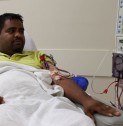
Expert opinion - Kidney disease and COVID-19
For many years, experts at Menzies School of Health Research have contributed to the development and revision of national guidelines for health service delivery. The COVID-19 pandemic poses multiple challenges to how we deliver critical health services...
-

A new action plan to tackle kidney disease
The Government has launched the National Strategic Action Plan for Kidney Disease and awarded $3.5 million in funding to organisations to take immediate action.
-
Territorian recognised for research excellence
Menzies School of Health Research Associate Prof Hughes received the 2019 NHMRC Clinical Trials and Cohort Studies Award for the top-ranked application in the 2019 funding round at NHMRC’s annual awards in Canberra.
-
eGFR Study news - January 2020
In this edition of eGFR Study News, we summarise the key 2019 activities of the study team.
-
eGFR study news - January 2020
-

“Polycystic kidney disease, the most common genetic kidney disorder you've probably never heard of”
Autosomal-dominant polycystic kidney disease (ADPKD) is the most common genetic kidney disorder, and the fourth most common cause of kidney failure in Australian adults. It affects about one in 1,000 Australians.
-
$440 million funding boost for vital health and medical research for all stages of life
$6 million in research funding for three Indigenous health grants in the Northern Territory. This includes $2.5 million for an NHMRC Centre of Research Excellence at the Menzies School of Health Research to prevent and manage bronchiectasis, a lung disease which results in recurrent chest infections and is particularly common in Aboriginal and Torres Strait Islander people.
-
Senator reveals personal story of kidney disease
Nephrologist at the Menzies School of Health Research, Paul Lawton, said his research team had been investigating key causes that dramatically impact upon remote Aboriginal communities.
-
Curious Kids: why is urine yellow?
Dr Jaqui Hughes answers The Conversation's Curious Kids question explaining the functions of the kidney.
-

Sunday Territorian | Gift of life
Senator Malarndirri McCarthy discusses her kidney diseaese and treatment by Dr Paul Lawton
-
The Health Advocate Episode 11 - Renal Patients in Remote Communities
AHHA's Director of the Deeble Institute for Health Policy Research, Rebecca Haddock, sits down with Stephanie Pushka.
-
This Dialysis Patient From A Remote Community Has Spent Years In A Short-Stay Hostel
This delay in receiving the DSP is not unusual, according to Stefanie Puszka, a researcher with the Menzies School of Health Research and the ANU.
-
This Kidney Patient Thought Her Life Was At Risk.
Stefanie Puszka, a researcher with the Menzies School of Health Research talks to BuzzFeed News.
-

SMH | Hope and healing
A new approach to treatment is helping Indigenous Australians fight kidney disease
-
Fixing health—why housing and income policy must be part of the mix
In an AHHA issues brief released today, Stefanie Puszka outlines why housing and income policy changes needed to improve health outcomes.
-
COAG Health Council | Communiqué 8 March 2019
The Federal, state and territory Health Ministers met in Adelaide at the COAG Health Council to discuss a range of national health issues.
-

The Australian | Shortfall in transplants
A recent study in The Medical Journal of Australia found indigenous people on dialysis were “substantially less likely” than other Australians to be placed on the waiting list for a kidney.
-
The Wire | Kidney bias: Indigenous Australians missing out on transplants
Menzies has released a study highlighting the life-saving surgery many are missing out on and co-author Dr Paul Lawton spoke about some of the key findings.
-
National Indigenous Times | Indigenous patients in need of new kidneys aren’t getting a fair go
Indigenous patients with kidney disease are missing out on transplants because they are not being put on waiting lists for the potentially life-saving surgery, new research has found.
-

Health system struggling with organ donation success
Researchers from the University of Adelaide, Royal Adelaide Hospital, Menzies School of Health Research and Australia and New Zealand Dialysis and Transplant Registry found the disparity had barely changed over time.
-

National review to investigate low Indigenous kidney transplant rates
One of the members of the panel will be Dr Jaqui Hughes, Australia’s only Aboriginal and Torres Strait Islander nephrologist, based at the Royal Darwin Hospital and at the Menzies School of Health Research, who said the news of the inquiry was “really welcome”.
-
Feds unveil review of kidney process | NT News
The Federal Government is poised to announce an inquiry into indigenous access to kidney transplants.
-

'Our kids need proper water': Families plead for action over uranium in drinking water
Respected Northern Territory kidney specialist Alan Cass, from the Menzies School of Health Research, said those claims needed "careful research".
-
Budget 2018: Aboriginal patients convinced the Government to help them get home
On her island home, far away from talk of tax cuts and budget wins and losses, Jacqueline Amagula got the news she has been waiting and fighting for.
-
Win for dialysis patients in Northern Territory
THE Territory’s kidney disease sufferers will be the major beneficiaries of a new Medicare item to be announced by the Turnbull Government today.
-
NT News | Meetings for Health School
Menzies School of Health Research is hosting the first consultation to establish patient and community led national guidelines to be added to the overall management plans for people affected by kidney health issues.
-
Creating better guidelines for kidney health management
Menzies School of Health Research (Menzies) is hosting the first consultation to establish patient and community led national guidelines to be added to the overall management plans for people affected by kidney health issues.
-
Roundtable Towards Roadmap For Renal Health - Media Release
A renal roundtable convened by Indigenous Health Minister Ken Wyatt AM in Darwin began charting the roadmap this week.
-

ABC | Opinion: Not all doctors agree my patient deserved his kidney transplant.
Just before Christmas 2016, a 68-year-old man received a kidney transplant, one of 1,091 Australians that year.
-

Indigenous Australians far less likely to get a kidney transplant
One in four Indigenous Australians will develop kidney disease, but new figures show that they are far less likely to be able to access a kidney transplant.
-

Fair access demanded for patients
KOORI MAIL | Remote Aboriginal Australians with kidney disease have demanded equitable access to life-saving treatment closer to home to prevent the removal of people from their traditional homelands.
-

Listen to Indigenous patient experts on how to transform renal care
Their concerns and solutions are documented in a new report by the Menzies School of Health Research in Darwin: Indigenous Patient Voices: gathering perspectives, finding solutions for chronic and end stage kidney disease.
-

Racist’ heath system failing NT Indigenous kidney patients
Menzies School of Health Research senior fellow and Dr G Yunupingu’s doctor Paul Lawton said while a non-indigenous kidney patient living in Darwin was as or more likely to receive a transplant as someone living in Sydney or Melbourne, that was not the case for Aboriginal people.
-

Indigenous patients left feeling ’isolated’
AN INDIGENOUS dialysis patient being away from home and families is no good. That’s one of the messages from indigenous kidney patients calling for equitable care in a new report from Menzies School of Health Research.
-

Remote kidney patients face homelessness
Patients and their support networks have called for equal health care closer to their homes in a new report released by the Menzies School of Health Research in the Northern Territory.
-

Indigenous Australians travelling 1000 kilometres for kidney dialysis: report
In a new Menzies School of Health Research report, patients and carers from across northern and central Australia called on state, territory and federal government health ministers to overhaul the system to provide more holistic care.
-

Indigenous kidney patients call for equitable care in new report
Indigenous people with kidney disease living in remote and rural Australia as well as their support networks have made a resounding call for equitable health care closer to home in a report released today by Menzies School of Health Research.
-

Lucky Luke - The Darwin poet whose muse is a dialysis machine
In the Northern Territory in the 1990s, an Indigenous person was estimated to be 15 to 30 times more likely to have kidney failure than a non-Indigenous person. It was this disparity that compelled Paul Lawton, a kidney specialist, to move to Darwin from Melbourne.
-

Preterm babies at risk of developing kidney disease
How healthy we are in adulthood is, in many ways, determined while we are still in the womb. Babies born prematurely could be at greater risk of developing kidney disease later in life according to a landmark Monash University study investigating the impacts of preterm birth on kidney development.
-

Dr Jaqui Hughes interview, National TalkBlack
Kidney specialist, Dr Jaqui Hughes talks to National TalkBlack
-

Kimberley patients forced to travel thousands of kilometres for essential dialysis training
A kidney health forum held in Darwin last week tabled the concerns of remote dialysis patients from Western Australia and the Northern Territory.
-

ABC Online | Indigenous dialysis patients pushing for grassroots community health services
Aboriginal dialysis patients say too many people are dying a lonely death away from their families, because they cannot be treated at home. In remote parts of Australia, patients whose kidneys are failing often have to leave their home communities to seek dialysis treatments in larger cities and towns.
-

CAAMA | Great potential to learn from Aboriginal people
The winner of a prestigious Kidney Health Australia Clinical Science Award says kidney specialists need to better understand Aboriginal and Torres Strait Islander views on kidney transplant and how they wish to deal with kidney disease in communities.
-
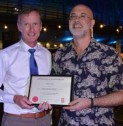
NT News - Kidney research wins prize
NT NEWS reports Professor Alan Cass, wins the prestigious Kidney Health Australia Clinical Science Award.
-

Professor Alan Cass, wins clinical science award
Kidney specialist and Director of Menzies School of Health Research (Menzies), Professor Alan Cass, was presented with the prestigious Kidney Health Australia Clinical Science Award tonight at the 53rd Annual Scientific Meeting of the Australian and New Zealand Society of Nephrology (ANZSN ASM) conference dinner.
-

Indigenous voices to be heard
Indigenous people with end-stage kidney disease from across northern and central Australia will be sharing their stories at an upcoming kidney conference in the hope of effecting change.
-

Organ Transplantation in Australia: Inequities in Access
Transplantation Journal | Organ Transplantation in Australia: Inequities in Access and Outcome for Indigenous Australians.
-

ABC Radio National - 'tsunami' of kidney disease
At the Garma Festival in the Northern Territory, RN Drive's Patricia Karvelas sat down with two experts in the field. Melanie Rarrtjiwuy Herdman Representing the CEO of Miwatj Health Dr Paul Lawton Kidney specialist from the Menzies School of Health Research who treated Dr G. Yunupingu
-

Australian Financial Review - Dr Paul Lawton at Garma
The loss of Dr G Yunupingu to kidney disease has shone a light on the "largely preventable" renal health nightmare afflicting remote communities, his doctor says.
-

Building care relationships in Alice Springs
Story-sharing builds care relationships in Alice Springs Kidney disease affects many Indigenous families in Central Australia. People are forced to leave their home communities to access life-maintaining dialysis treatment in major towns like Alice...
-

ABC Life Matters - the gap in Indigenous life expectancy
The death this week of the wonderful singer Dr G Yunipingu at the age of just 46 from long-term illness, brings home once again the disparity in life expectancy between Indigenous and non-Indigenous Australians.
-

Dr G Yunupingu chose to leave dialysis knowing he would die, doctor says
Late Arnhem Land musician Dr G Yunupingu chose to end his dialysis treatment knowing the dire consequences that would follow, his doctor has told the ABC.
-

Medicare Review Taskforce’s recommendation for ‘on country’ dialysis
Menzies Director Professor Alan Cass, is also the Chair of the Renal Clinical Committee which is recommending a dedicated MBS item number to support ‘on country’ dialysis.
-

NHMRC fellow shapshot: Dr Paul Lawton
Menzies research fellow, Dr Paul Lawton was recently awarded an Early Career Fellowship as part of the National Health and Medical Research Council’s (NHMRC) yearly multi-million dollar funding round. Paul’s fellowship provides support for his...
-

Top End health service delaying need for dialysis treatment amid soaring demand
A kidney health program at a Top End health service is making inroads in the battle against dramatically rising numbers of patients with dialysis-dependency and renal failure.
-

Powerful predictor for the progression of kidney disease in Aboriginal and Torres Strait Islander populations
Study reveals powerful predictor for the progression of kidney disease in Aboriginal and Torres Strait Islander populations
-

Kids get kidney message
EARLY education is the best way to bring down the NT's sky-high rate of kidney disease, according to Kidney Health Australia medical adviser Alan Cass.
-

Australian Story: Mother's Day
Ronald "Ronno" Morgan is a young tour guide from Wyndham in Western Australia's spectacular Kimberley region. But he's lucky to be alive, having twice faced a life-threatening challenge – first as a five-year-old and again as an adult. Until recently, his life was very much a roller coaster but he was fortunate to have the strong support of a very close family.
-

Ronald's story to be told
It's been more than two decades since Maria Morgan gave her son Ronald the best gift she could, one of her own kidneys, which enabled him to live independently for 23 years.
-

Mother's Day
At age five, Ronno Morgan was a young Aboriginal boy from the Kimberly suffering from kidney failure and requiring emergency surgery
-

World first research shows shocking numbers of preventable deaths from gaps in kidney failure treatment
Research by Menzies director Professor Alan Cass in collaboration with The George Institute for Global Health has shown that more than two million people globally die unnecessarily every year because they cannot access treatment for kidney failure (dialysis or a kidney transplant).
-
MJA Insight: 'Let’s end kidney care disparity'
Redoubling efforts to prevent Indigenous Australians developing end-stage kidney disease is crucial given the social and practical difficulties of delivering complex care such as dialysis and transplantation in remote Australia, Dr Paul Lawton has warned.
-
Study reveals new ground made in fight against kidney disease
New research has revealed an improvement in life expectancy for those suffering from end-stage kidney disease.
-

Leading kidney researcher asks for greater engagement this World Kidney Day
To mark World Kidney Day, Australia’s first Indigenous kidney specialist has expressed a need for research institutes to have a greater level of engagement with the people who participate in their research efforts.
-
730NT: Fight against kidney disease scourge
For people from remote communities, the diagnosis of kidney failure often means moving far from home to have life-saving dialysis. Some communities are so concerned about the increasing number of people leaving for dialysis, that they've rallied to set up their own clinics.
-

Body and build of Indigenous Australians in the spotlight
The first ever detailed study of the body build and composition of Aboriginal and Torres Strait Islander people has been undertaken to help reduce the risk and impact of kidney disease in Indigenous populations.
-

Esteemed kidney specialist recognised with national health science award
One of Australia’s leading kidney specialists has been recognised with a prestigious national award for his contributions to kidney health and advancing Indigenous health.

